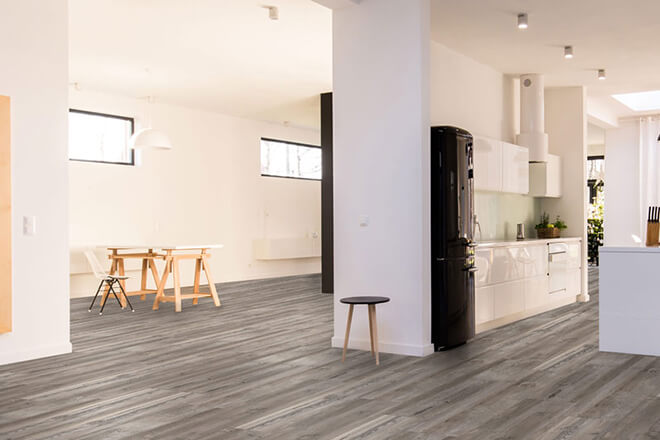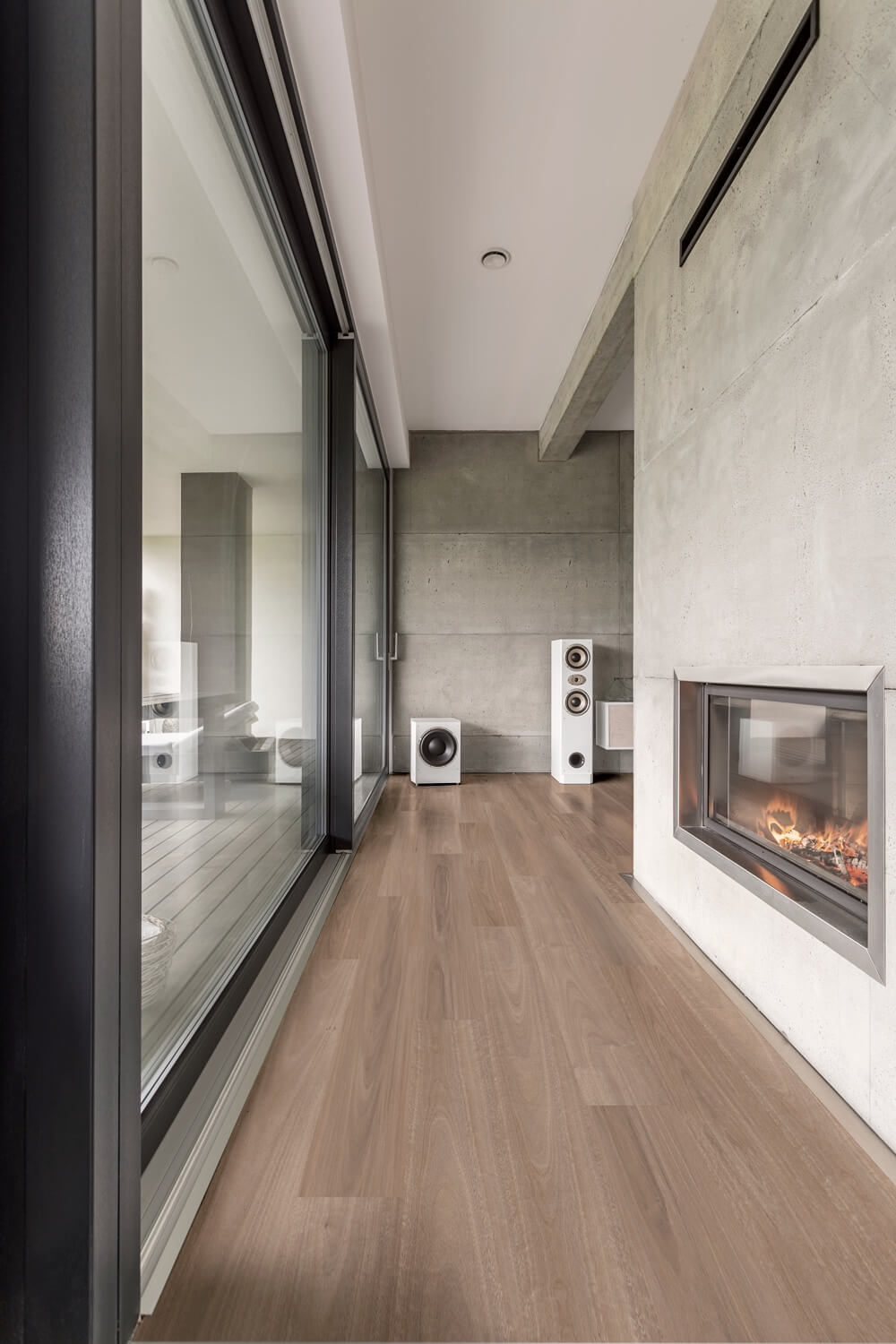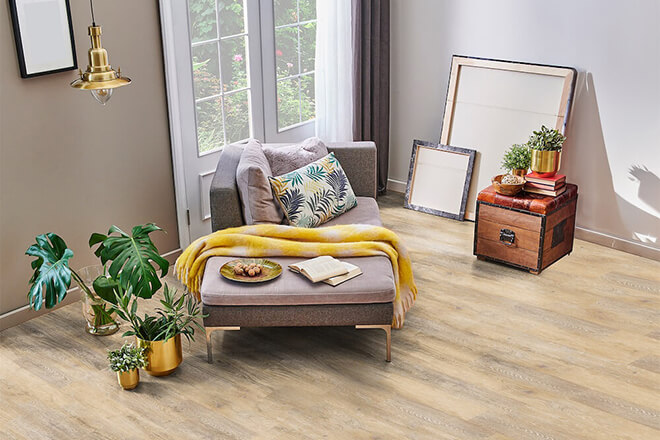The durable nature of the product of vinyl planks means cleaning the floor is simple. You have to know the basics. Regular maintenance and proper cleaning keep your vinyl floors looking great and extend their lifespan. We’ve written this comprehensive guide to help you clean vinyl plank floors effectively.
In case you are in a rush, here are the cleaning and maintenance basics first:
- Sweep/vacuum regularly to prevent scratches by removing dirt and debris.
- Use a damp mop with a pH-neutral cleaner to avoid excess water and harsh chemicals.
- Clean spills immediately to prevent stains and damage.
- Use furniture pads and mats to protect floors from scratches and dirt.
- Avoid steam cleaners at all costs.

General Cleaning and Maintenance of Vinyl Flooring
Ongoing vinyl flooring maintenance is vital to preserving the longevity and appearance of your floors. Regular cleaning, prompt spill cleanup, and preventive measures like using mats and furniture pads will minimize damage. Additionally, avoid dragging heavy objects across the floor to prevent scratches, and keep your floors out of direct sunlight to reduce the risk of fading.
Follow these maintenance tips to ensure that your vinyl floors remain in excellent condition:
-
Sweeping and Vacuuming
Regular sweeping and vacuuming are essential for cleaning vinyl plank flooring. Use a soft-bristle broom or a vacuum with a hard floor setting to remove dirt and debris. This step is crucial for preventing scratches and keeping your floors in top condition.
-
Damp (not wet) Mopping
The best way to clean vinyl plank floors is with a damp mop and a pH-neutral vinyl floor cleaner. Avoid using too much water, as excess moisture can seep into seams and damage the subfloor. After mopping, dry the floor to prevent water spots and maintain its shine.
The best mop for vinyl floors is a microfiber mop. Microfiber is gentle on the surface, effectively picking up dirt without scratching or causing damage. Additionally, microfiber mops require only a tiny amount of water, reducing the risk of moisture damage. Always wring out the mop thoroughly before use to avoid leaving excess water on the floor for best results.

Expert Insights From Clem Sturgess
20+ years' experience in hard flooring
The best cleaner for vinyl plank floors is a pH-neutral cleaner specifically designed for vinyl and laminate flooring. These cleaners effectively remove dirt and grime without damaging the floor’s surface or leaving any residue. Avoid harsh chemicals like bleach or ammonia, as they can strip away the protective finish and dull the floor’s appearance.
-
Cleaning Spills Quickly
Spills should be wiped immediately using a soft cloth or a damp mop. Prompt cleaning prevents staining and keeps your vinyl floors looking their best. This is one of the most effective tips for maintaining the appearance of the vinyl floor.
-
Cleaning Vinyl Floors with Ground-In Dirt
Cleaning vinyl floors with ground-in dirt involves a bit more effort. Start by applying a pH-neutral cleaner directly to the affected area. Let it sit for a few minutes to loosen the dirt. Then, gently scrub the area with a soft-bristle brush or a non-abrasive pad. Avoid using harsh scrubbers that could damage the floor’s surface. Finish by wiping the area with a damp microfiber cloth to remove any residue.
-
Stain Removal
For stubborn stains, use a baking soda and water paste or apply rubbing alcohol. Test in a small area first to ensure it doesn’t damage the finish. Avoid using abrasive scrubbers that could scratch the surface of your vinyl flooring.
Vinyl Floor Polishing
Consider using a vinyl floor polish to restore the shine and maintain the beauty of your vinyl plank floors. Polishing helps rejuvenate the surface, giving it a fresh, glossy look.
- Follow the manufacturer’s instructions carefully, applying the polish evenly across the floor.
- Allow it to dry completely before walking on it.
Regular polishing, typically every few months, can keep your floors looking new and help protect against wear and tear.
Damage and Wear Prevention
-
Furniture Pads
Apply felt pads to the legs of your furniture to prevent scratches when moving items. This step is especially important for heavier furniture. For best results, lift rather than drag furniture across the floor.
-
Entrance Mats
Place mats at entrances to trap dirt and debris before they reach your vinyl floors. This reduces the amount of dirt and grit that can cause scratches, helping to maintain the floor’s appearance.
-
Avoid Steam Cleaners
Steam cleaners are not recommended for vinyl plank floors. The high heat and moisture can cause the flooring to warp or weaken over time. Instead, use a damp mop and a pH-neutral cleaner to clean your vinyl floors safely.
Vinyl Floor Maintenance is Easy
Sweeping and vacuuming regularly, using a damp microfiber mop with a pH-neutral cleaner, and cleaning spills immediately can ensure your floors remain beautiful and durable. Polishing and preventive measures like mats and furniture pads protect your floors.
Follow these best practices to maintain the shine and longevity of your floors. Check out our cleaning and care tips section for more information on maintaining other flooring types, such as cleaning hybrid floors.
FAQs
The best floor cleaner for vinyl planks is a pH-neutral cleaner specifically designed for vinyl flooring. These cleaners effectively remove dirt and grime without damaging the floor's protective coating. Avoid harsh chemicals like bleach, ammonia, or abrasive cleaners, as they can dull the finish and potentially harm the flooring.
No, it would be best not to use a steam mop on vinyl planks. The high heat and moisture from steam mops can cause the vinyl planks to warp, swell, or weaken over time. Instead, use a damp microfiber mop with a pH-neutral cleaner for safe and effective cleaning.
The best mop for vinyl plank floors is a microfiber mop. Microfiber mops are gentle on the surface and effectively capture dirt and dust without scratching the floor. Additionally, they require minimal water, reducing the risk of moisture damage to the vinyl planks.
Vinyl floor polishing involves applying a specialized polish to the surface of your vinyl flooring to restore its shine and protect it from wear and tear. This process helps rejuvenate the floor's appearance, giving it a fresh, glossy finish. Polishing also adds a protective layer that can help extend the life of your vinyl floors, though it should be done according to the manufacturer's instructions to avoid buildup or damage.




